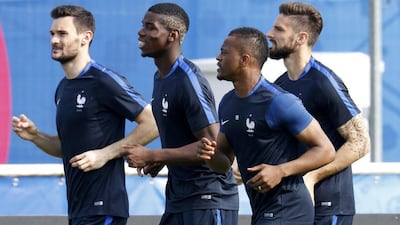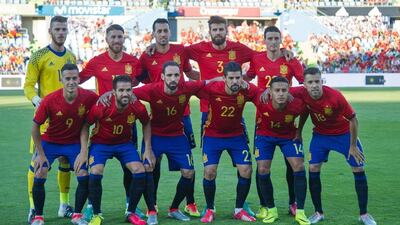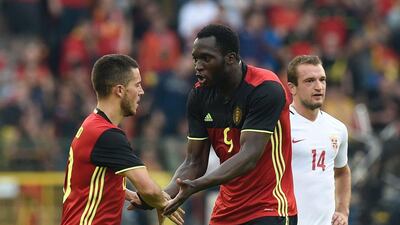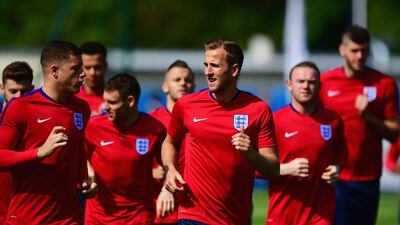After weeks of build-up and anticipation, the 2016 European Championship is almost here. On the eve of the tournament, The National's football correspondents and the Sports Editor, Thomas Woods, make their arguments for which team will be the eventual winners of Euro 2016.
Follow us on Twitter @NatSportUAE
Like us on Facebook at facebook.com/TheNationalSport
Richard Jolly — Why France will win
The 1984 European Championships were held in France. France won that. The 1998 World Cup was held in France. France won that, too. It is not merely history which suggests they will prevail in Euro 2016, or even the presence of the 1998-winning captain, Didier Deschamps, as manager, but it does show home advantage can be a huge benefit. And in a tournament that may contain several excellent, evenly-matched but by no means great sides, it could be decisive. So, of course, could Paul Pogba, who has the potential to be associated as indelibly with Euro 2016 as Michel Platini and Zinedine Zidane were with the last international competitions held on French soil. Plus there is the sense that, while it might not necessarily be coming at an ideal point for Germany, Belgium or Italy, Euro 2016 is well timed for France. Their plans are taking shape nicely. They have seven wins in eight, with their only defeat coming when, understandably grief-struck by the Paris terror attacks, they put in a distracted performance against England. They also have players in form, generally a common denominator of successful international sides. Pogba and Patrice Evra should be buoyed by Juventus’ startling revival. Atletico Madrid’s Antoine Griezmann has become more prolific and taken his game to a new level. While there is the chance that Karim Benzema and Mamadou Sakho will be missed, France still have perhaps more strength in depth than any other European nation, aided by a host of in-form players who are suggesting they could come from the fringes to play a pivotal part, whether N’Golo Kante, Dimitri Payet, Anthony Martial, or Kingsley Coman. It puts an onus on Deschamps to identify his best side from a multitude of options. Do so, and he may get his hands on more silverware.
Andy Mitten — Why Spain will win
Spain’s 0-1 friendly defeat to Georgia, a team ranked 137th in the world, could be just the shock to the system the reigning European champions need. If they are celebrating a third successive European crown in a month in Paris then the friendly defeat — their first loss in 15 months — won’t matter one bit, but it exposed the niggling issues affecting Vicente del Bosque’s squad. None of the other 23 competing squads could think of leaving out midfielders of the quality possessed by Spain, who are aiming for a third successive European title, yet Spain’s worry has been the lack of a go-to striker. Midfielder Cesc Fabregas had even played further upfield in the false nine role beloved by amateur football tacticians, but Juventus’ Alvaro Morata looks set to lead Spain’s line. The Madrileno, who is about to leave the Turin club, missed the game against Georgia with a minor injury, but eight of the starting lineup could be expected to begin Spain’s first game against Czech Republic. Spain’s back five of David De Gea; Juanfran, Gerard Pique, Sergio Ramos and Jordi Alba is their best, but it was they who were caught short against the Georgians. The defeat need not matter. Spain enjoyed 80 per cent of possession, but Georgia were happy to defend as their Euro foes will have noted. Spain’s defensive record in qualification wasn’t bettered by any of the competing teams, but they have to get goals. Aritz Aduriz didn’t impress against Georgia and Del Bosque maintains Morata can be a star. He’ll have a better midfield support — led by Andres Iniesta — than any other player in France. There were doubts at the start of Euro 2012, before Spain improved to hammer Italy 4-0 in the final. There are doubts now, but this stylish Spanish team has the quality to retain the trophy. Their group, featuring Turkey, Croatia and the Czechs, is sufficiently hard to get them well prepared for tougher matches.
Greg Lea — Why Germany will win
It is difficult to look past the world champions being crowned kings of the continent in France this summer. For starters, the current side now has the tournament-winning experience that their French, English, Belgian, Italian and Portuguese counterparts lack. That should stand them in good stead when it comes to the latter stages of the competition, with the traditional German winning mentality still imbued in the squad despite the stylistic departure from past teams. Indeed, Germany are no longer reliant on grinding out victories with efficient finishing and hard work, as the stereotype used to suggest. Joachim Low’s men are capable of playing fine attacking football, with fluid interchanging of positions and a heady blend of technical and physical gifts. Perhaps most importantly of all, Germany have a number of world-class players to call upon. Manuel Neuer is the best goalkeeper on the planet and Jerome Boateng arguably the best defender. Toni Kroos is a key midfield cog for Real Madrid, Mesut Ozil is coming off the back of a superb season with Arsenal and Thomas Muller is in the form of his life. Throw in Mario Gotze, Sami Khedira and Mats Hummels and it is immediately clear why Germany are many people’s favourites to triumph this summer. Admittedly, their form since the World Cup two years ago has been patchy, defeats by Poland, the Republic of Ireland, Argentina, England, the United States and France provoking varying degrees of concern, but Germany will be a different team once the first ball has been kicked in June. They have quality throughout the team, experience of winning tournaments, a well-balanced first team and a myriad of different ways to harm opponents.
Thomas Woods — Why Belgium will win
Everything seems to be falling into place for Belgium. They’ve dominated two successive qualifying tournaments and impressed at the last World Cup. Their squad is now older, wiser and better prepared to mount a serious bid for a major trophy. If you are getting excited about some of the names in France’s squad, then Belgium’s is even better, at least on paper. The spine of the team is sensational. Thibaut Courtois in goal is one of the world’s best stoppers. They have two parts of one of the Premier League’s best defences in their back four, Jan Vertonghen and Toby Alderweireld. Up front, Romelu Lukaku is coming off the back of a 25-goal season for Everton. He was tepid at the 2014 World Cup but looks like he means business this time around. But it is in midfield where they have the tools to dominate any team. Eden Hazard, Kevin de Bruyne — that’s two of the world’s best already. Throw in Radja Nainggolan, Mousa Dembele, Axel Witsel, Yannick Carrasco ... the list goes on. They have a Plan B in the brute force of Marouane Fellaini and/or Christian Benteke and wild card impact players such as Divock Origi. The World Cup was probably too early for them and they fell flat in the quarter-finals against Argentina. But they will hope to use that experience and should at the very least make the last four. From there it is anyone’s game, with one moment of magic all it takes to win a game. And they have a first team packed with the kind of players who can do that.
Ian Hawkey Why a new name will be on the cup
Europe needs a new champion. The major trophies across the continent are being monopolised. Each of the league titles in Spain, Italy, Germany and France have just been won by the same clubs who won them in 2015; the Uefa Champions League final was contested by the same two clubs, from the same city, Madrid, who jousted it out in 2014. The Europa League has just gone for the third year running to Sevilla. So much for club football and its closed shops. International tournament football, while often less engaging a spectacle than the best of what we watch for nine months of the year from the top club sides, is more open to springing surprises. Chile were victorious last summer in the Copa America, bettering the likes of Brazil, Argentina and Uruguay and engraving a new name on that historic Cup. Greece did the same only three European championships ago. These Euros look ripe for another fresh name on the trophy. On paper, there is no squad that looks head and shoulders above the rest. And the Euros have a healthy disrespect for the traditional heavyweight class. Denmark as well as Greece have won the event in recent times. Czechoslovakia lifted the trophy in the mid-1970s. That neither of those three states are among the 24 countries involved in this, the expanded 2016 version of the competition — though both the Czech Republic, and Slovakia, the two countries formed from the old Czechoslovakia are in — indicates that upstarts are also vulnerable to sharp gravitational pulls. But the Greeks and the Danes are there in spirit, being regularly cited as inspiring precedents for those who want to muscle past the favourites. England, the country where Leicester City have just bucked wider trends to carry off the Premier League title, have some zip about them, some youthful fearlessness in the squad, and a hunger for a major prize, five barren decades after they won their only World Cup. Portugal have Europe’s best individual footballer, Cristiano Ronaldo, and some emerging talents in his slipstream. Belgium are blessed with talent in depth. And Croatia’s midfield excellence, and canniness in attack, gives them a pedigree, too — more than Denmark or Greece seemed to boast when they stole off with the main prize.





